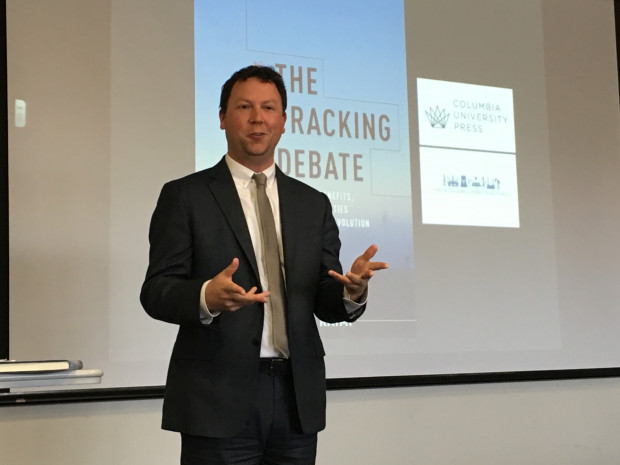
A hydraulic fracturing site in Susquehanna County, Pa. The central missile of the fracking operation connects 16 compression generators, water, sand, and other fluids before entering the well.
Lindsay Lazarski / WHYY


A hydraulic fracturing site in Susquehanna County, Pa. The central missile of the fracking operation connects 16 compression generators, water, sand, and other fluids before entering the well.
Lindsay Lazarski / WHYY

Lindsay Lazarski / WHYY
A hydraulic fracturing site in Susquehanna County, Pa. The central missile of the fracking operation connects 16 compression generators, water, sand, and other fluids before entering the well.

Daniel Raimi, author of the newly released book “The Fracking Debate,” speaks at the University of Pittsburgh.
As Pennsylvania’s gas boom helps propel the United States away from coal-fired power, one energy researcher says the impact on climate change will be a wash.
Burning natural gas for electricity emits less carbon dioxide than burning coal. That’s good news for climate change in the short term, but a number of other factors negate the long-term benefits of transitioning to more natural gas power, said Daniel Raimi, a senior research associate with the think tank Resources for the Future.
“A world with the shale revolution and a world without the shale revolution don’t look that different in terms of greenhouse gas emissions,” he said.
Raimi addressed the topic Wednesday during a visit to the University of Pittsburgh, as it’s something he writes about in his new book. In “The Fracking Debate,” he wades through numerous studies on controversial oil- and gas-related issues to offer nuanced answers to the questions people at dinner parties often ask him about fracking.
One of those questions is whether shale development is good or bad for the climate. The answer, he concludes, must take into consideration more than the difference in emissions from coal and gas power plants.
“Natural gas competes with coal, but it also competes with renewables like wind and solar. It competes with existing nuclear plants,” he said.
Nuclear plants have historically been a major source of carbon-free energy, but they’re struggling to compete as cheap gas takes hold of the market.
“Low-cost energy in the form of natural gas and oil encourages people to use more energy, and when people use more energy, the emissions also rise,” he said.
Raimi said those factors ultimately will cancel out the benefits of lower emissions from gas, as long as shale development continues like it has the past decade. But the shale energy boom also presents an opportunity to further address global warming should lawmakers enact policies like putting a price on carbon or investing more in researching new energy technologies, he said.
StateImpact Pennsylvania is a collaboration among WITF, WHYY, and the Allegheny Front. Reporters Reid Frazier, Rachel McDevitt and Susan Phillips cover the commonwealth’s energy economy. Read their reports on this site, and hear them on public radio stations across Pennsylvania.
(listed by story count)
StateImpact Pennsylvania is a collaboration among WITF, WHYY, and the Allegheny Front. Reporters Reid Frazier, Rachel McDevitt and Susan Phillips cover the commonwealth’s energy economy. Read their reports on this site, and hear them on public radio stations across Pennsylvania.
Climate Solutions, a collaboration of news organizations, educational institutions and a theater company, uses engagement, education and storytelling to help central Pennsylvanians toward climate change literacy, resilience and adaptation. Our work will amplify how people are finding solutions to the challenges presented by a warming world.